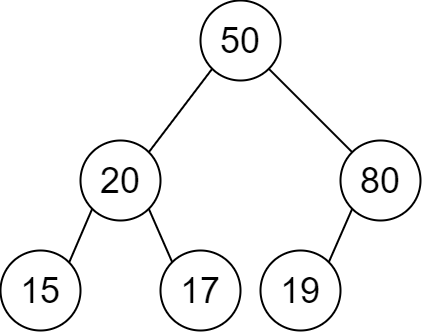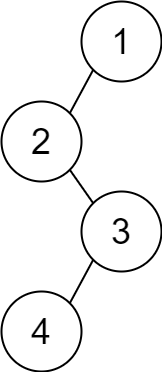Welcome to Subscribe On Youtube
2196. Create Binary Tree From Descriptions
Description
You are given a 2D integer array descriptions where descriptions[i] = [parenti, childi, isLefti] indicates that parenti is the parent of childi in a binary tree of unique values. Furthermore,
- If
isLefti == 1, thenchildiis the left child ofparenti. - If
isLefti == 0, thenchildiis the right child ofparenti.
Construct the binary tree described by descriptions and return its root.
The test cases will be generated such that the binary tree is valid.
Example 1:

Input: descriptions = [[20,15,1],[20,17,0],[50,20,1],[50,80,0],[80,19,1]] Output: [50,20,80,15,17,19] Explanation: The root node is the node with value 50 since it has no parent. The resulting binary tree is shown in the diagram.
Example 2:

Input: descriptions = [[1,2,1],[2,3,0],[3,4,1]] Output: [1,2,null,null,3,4] Explanation: The root node is the node with value 1 since it has no parent. The resulting binary tree is shown in the diagram.
Constraints:
1 <= descriptions.length <= 104descriptions[i].length == 31 <= parenti, childi <= 1050 <= isLefti <= 1- The binary tree described by
descriptionsis valid.
Solutions
-
/** * Definition for a binary tree node. * public class TreeNode { * int val; * TreeNode left; * TreeNode right; * TreeNode() {} * TreeNode(int val) { this.val = val; } * TreeNode(int val, TreeNode left, TreeNode right) { * this.val = val; * this.left = left; * this.right = right; * } * } */ class Solution { public TreeNode createBinaryTree(int[][] descriptions) { Map<Integer, TreeNode> m = new HashMap<>(); Set<Integer> vis = new HashSet<>(); for (int[] d : descriptions) { int p = d[0], c = d[1], isLeft = d[2]; if (!m.containsKey(p)) { m.put(p, new TreeNode(p)); } if (!m.containsKey(c)) { m.put(c, new TreeNode(c)); } if (isLeft == 1) { m.get(p).left = m.get(c); } else { m.get(p).right = m.get(c); } vis.add(c); } for (Map.Entry<Integer, TreeNode> entry : m.entrySet()) { if (!vis.contains(entry.getKey())) { return entry.getValue(); } } return null; } } -
/** * Definition for a binary tree node. * struct TreeNode { * int val; * TreeNode *left; * TreeNode *right; * TreeNode() : val(0), left(nullptr), right(nullptr) {} * TreeNode(int x) : val(x), left(nullptr), right(nullptr) {} * TreeNode(int x, TreeNode *left, TreeNode *right) : val(x), left(left), right(right) {} * }; */ class Solution { public: TreeNode* createBinaryTree(vector<vector<int>>& descriptions) { unordered_map<int, TreeNode*> m; unordered_set<int> vis; for (auto& d : descriptions) { int p = d[0], c = d[1], left = d[2]; if (!m.count(p)) m[p] = new TreeNode(p); if (!m.count(c)) m[c] = new TreeNode(c); if (left) m[p]->left = m[c]; else m[p]->right = m[c]; vis.insert(c); } for (auto& [v, node] : m) { if (!vis.count(v)) return node; } return nullptr; } }; -
# Definition for a binary tree node. # class TreeNode: # def __init__(self, val=0, left=None, right=None): # self.val = val # self.left = left # self.right = right class Solution: def createBinaryTree(self, descriptions: List[List[int]]) -> Optional[TreeNode]: g = defaultdict(TreeNode) vis = set() for p, c, left in descriptions: if p not in g: g[p] = TreeNode(p) if c not in g: g[c] = TreeNode(c) if left: g[p].left = g[c] else: g[p].right = g[c] vis.add(c) for v, node in g.items(): if v not in vis: return node -
/** * Definition for a binary tree node. * type TreeNode struct { * Val int * Left *TreeNode * Right *TreeNode * } */ func createBinaryTree(descriptions [][]int) *TreeNode { m := make(map[int]*TreeNode) vis := make(map[int]bool) for _, d := range descriptions { p, c, left := d[0], d[1], d[2] if m[p] == nil { m[p] = &TreeNode{Val: p} } if m[c] == nil { m[c] = &TreeNode{Val: c} } if left == 1 { m[p].Left = m[c] } else { m[p].Right = m[c] } vis[c] = true } for v, node := range m { if !vis[v] { return node } } return nil } -
/** * Definition for a binary tree node. * class TreeNode { * val: number * left: TreeNode | null * right: TreeNode | null * constructor(val?: number, left?: TreeNode | null, right?: TreeNode | null) { * this.val = (val===undefined ? 0 : val) * this.left = (left===undefined ? null : left) * this.right = (right===undefined ? null : right) * } * } */ function createBinaryTree(descriptions: number[][]): TreeNode | null { const map = new Map<number, [number, number]>(); const isRoot = new Map<number, boolean>(); for (const [parent, child, isLeft] of descriptions) { let [left, right] = map.get(parent) ?? [0, 0]; if (isLeft) { left = child; } else { right = child; } if (!isRoot.has(parent)) { isRoot.set(parent, true); } isRoot.set(child, false); map.set(parent, [left, right]); } const dfs = (val: number) => { if (val === 0) { return null; } const [left, right] = map.get(val) ?? [0, 0]; return new TreeNode(val, dfs(left), dfs(right)); }; for (const [key, val] of isRoot.entries()) { if (val) { return dfs(key); } } return null; } -
// Definition for a binary tree node. // #[derive(Debug, PartialEq, Eq)] // pub struct TreeNode { // pub val: i32, // pub left: Option<Rc<RefCell<TreeNode>>>, // pub right: Option<Rc<RefCell<TreeNode>>>, // } // // impl TreeNode { // #[inline] // pub fn new(val: i32) -> Self { // TreeNode { // val, // left: None, // right: None // } // } // } use std::rc::Rc; use std::cell::RefCell; use std::collections::HashMap; impl Solution { fn dfs(val: i32, map: &HashMap<i32, [i32; 2]>) -> Option<Rc<RefCell<TreeNode>>> { if val == 0 { return None; } let mut left = None; let mut right = None; if let Some(&[l_val, r_val]) = map.get(&val) { left = Self::dfs(l_val, map); right = Self::dfs(r_val, map); } Some(Rc::new(RefCell::new(TreeNode { val, left, right }))) } pub fn create_binary_tree(descriptions: Vec<Vec<i32>>) -> Option<Rc<RefCell<TreeNode>>> { let mut map = HashMap::new(); let mut is_root = HashMap::new(); for description in descriptions.iter() { let (parent, child, is_left) = (description[0], description[1], description[2] == 1); let [mut left, mut right] = map.get(&parent).unwrap_or(&[0, 0]); if is_left { left = child; } else { right = child; } if !is_root.contains_key(&parent) { is_root.insert(parent, true); } is_root.insert(child, false); map.insert(parent, [left, right]); } for key in is_root.keys() { if *is_root.get(key).unwrap() { return Self::dfs(*key, &map); } } None } } -
/** * Definition for a binary tree node. * function TreeNode(val, left, right) { * this.val = (val===undefined ? 0 : val) * this.left = (left===undefined ? null : left) * this.right = (right===undefined ? null : right) * } */ /** * @param {number[][]} descriptions * @return {TreeNode} */ var createBinaryTree = function (descriptions) { const nodes = {}; const children = new Set(); for (const [parent, child, isLeft] of descriptions) { if (!nodes[parent]) { nodes[parent] = new TreeNode(parent); } if (!nodes[child]) { nodes[child] = new TreeNode(child); } if (isLeft) { nodes[parent].left = nodes[child]; } else { nodes[parent].right = nodes[child]; } children.add(child); } for (const [k, v] of Object.entries(nodes)) { if (!children.has(+k)) { return v; } } };